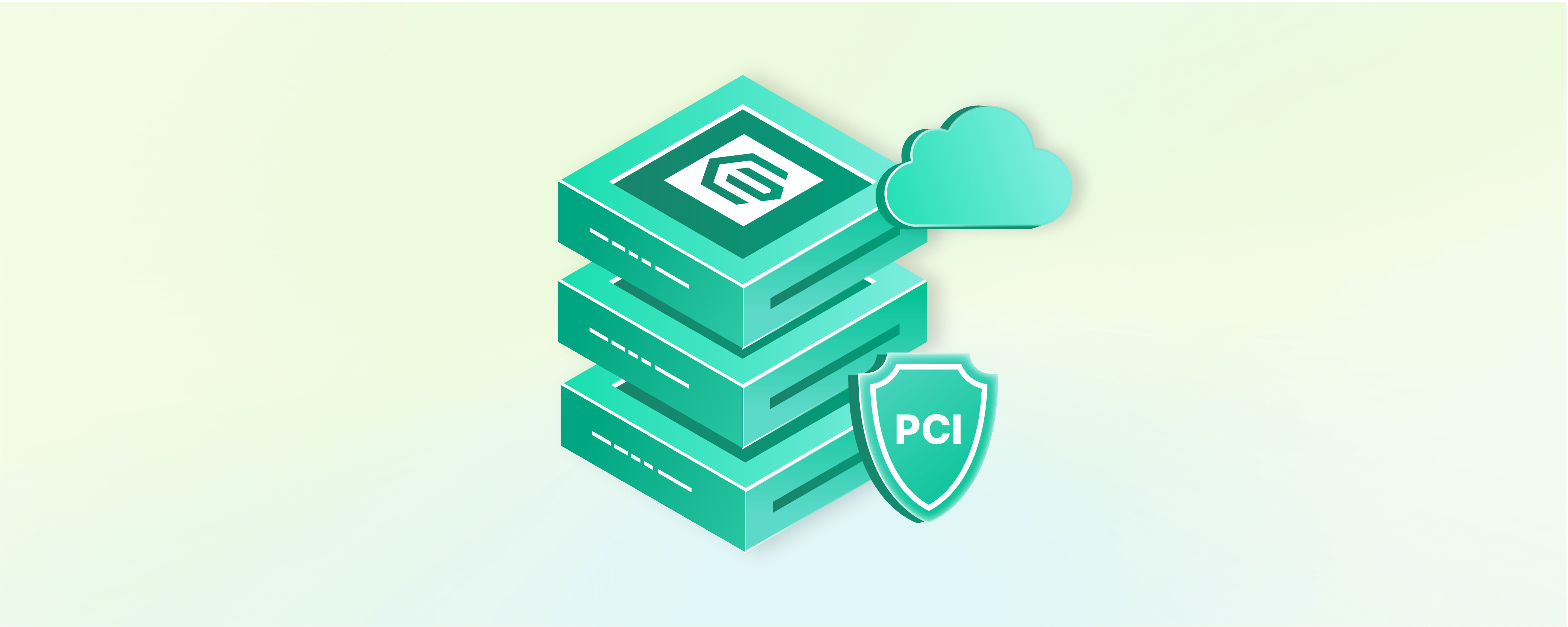
Magento PCI Compliant Hosting - Advanced Security Features
Magento stores facilitate secure online experiences through hosting solutions that support compliance. One of the primary ecommerce compliance standards is the Payment Card Industry Data Security Standard (PCI DSS). This blog explains how Magento PCI-compliant hosting helps ecommerce stores safeguard customer data.
Key Takeaways
-
Understand the critical role of Magento PCI-compliant hosting in safeguarding online stores.
-
Learn about Magento stores' six core PCI Compliance requirements.
-
Discover security features for Magento hosting, such as Data Loss Prevention strategies.
-
Recognize the importance of data center certifications, like SOC 2 and PCI DSS.
-
Grasp the significance of establishing trust through comprehensive privacy policies and SSL certificates.
Understanding PCI Compliance
PCI Compliance is a set of security standards for all companies that accept, process, and transmit credit card information. It is to ensure that online businesses maintain a secure environment. These standards protect the interests of consumers and the reputation of businesses.
PCI Compliance includes six core requirements for Magento ecommerce businesses. These requirements aim to:
-
Build and maintain secure networks
-
Protect cardholder data
-
Implement a vulnerability management program
-
Enforce strong access control measures
-
Regularly monitor and test networks
-
Maintain an information security policy
Security Requirements for Magento PCI Compliant Hosting
1. Security Features

The two main types of primary sources of protection for cyber attacks, also known as firewalls, are:
-
Stateful firewalls that monitor and filter traffic based on established connections block unauthorized traffic attempts.
-
Web Application Firewalls (WAFs) protect web applications like your Magento store. It detects and blocks SQL injection attacks and cross-site scripting (XSS).
-
IDP/IDS systems provide valuable logs and act as surveillance systems for your Magento store. The PCI Security Standards Council recommends the two types of IDP/IDS detection systems.
- Signature-based detection solutions use databases of known attack patterns for detection.
- Anomaly-based detection identifies deviations from normal traffic patterns, flagging potentially malicious behavior even for new or unknown threats.
Vulnerability management helps you identify weaknesses attackers could exploit to gain unauthorized access. This could also compromise cardholder data. It works through 3 types of deep scans:
-
External Scanning: Scans your website and supporting servers as they appear on the public internet. Additionally, identify vulnerabilities in externally-facing services (like your web server) and network configuration.
-
Internal Scanning involves looking inside servers for vulnerabilities in software, operating systems, and internal configuration issues.
-
Authenticated Scanning scans valid login credentials to gain more granular information on vulnerabilities within the Magento store.
Malware infections can compromise sensitive merchant data, violate PCI compliance, and damage your brand's reputation. This is how it works:
-
Signature-based detection compares files or network traffic against known malware signatures.
-
Heuristic-based detection analyzes file behavior, code structure, or system activity for suspicious patterns, even if the signature isn't in a database.
-
Quarantine and malware removal use reputable tools that isolate the infected files to prevent further spread. It also provides options for cleaning or deleting them.
-
Data Loss Prevention helps enforce PCI-compliant mandates protecting cardholder data. It is a set of technologies and strategies to prevent the unauthorized leakage of sensitive data. Here is how it works:
-
Data Classification: Identifying and categorizing sensitive data (credit card numbers, personally identifiable information, etc.) for maintaining PCI security standards.
-
Policy Enforcement: DLP solutions implement rules on what types of data can be accessed, stored, or transmitted and by whom.
-
Monitoring and Detection: Oversees data flows within a network and system, detecting attempts for unauthorized movement.
-
Alerting and Blocking: Warns admins about policy violations and can automatically prevent unauthorized data exfiltration attempts. Some hosting providers include DLP capabilities, while others rely on third-party integrations.
-
2. Data Center Certifications for Magento PCI Compliance

Datacenter certificates are rules focused on security,and handling unexpected events regarding your Magento store’s safety.
The two main certifications Magento providers must possess are SOC 2 (Type II) and PCI DSS.
SOC 2 is an independent audit report that evaluates a service organization's controls.
These controls include security, availability, processing integrity, confidentiality, and privacy (SAAICP). By choosing a provider with a SOC 2 Type II certification, you gain insight into:
-
Security: The strength of the data center's security controls to protect against unauthorized access, data breaches, and other threats.
-
Availability: The data center's ability to ensure uptime and prevent disruptions that could affect your Magento store's accessibility.
-
Processing Integrity: The data center's security measures are in place to ensure accurate and reliable processing of critical data for financial transactions.
-
Confidentiality: The data center's commitment to safeguarding sensitive data like cardholder information aligns with PCI requirements.
-
Privacy: The data center's practices regarding collecting, using, and disclosing personal data reflect your overall data privacy posture.
How does Magento Hosting Meet PCI Compliance?
Selecting the suitable type of hosting provider with the best practices of PCI compliance involves several factors:
1. Types of Magento hosting
-
Managed Hosting Services: Your provider shoulders a greater share of compliance responsibilities. This might include:
- Patching and Updates: The provider keeps systems up-to-date with the latest security patches.
- Vulnerability Scans: The provider conducts them on your behalf.
- Malware Detection: Proactive malware scans and remediation services are typically offered.
-
Unmanaged Hosting services: Merchants take on more ownership of security and compliance tasks. It might involve completing a PCI compliance questionnaire.
- Patch Management: Identifying, downloading, and securely implementing patches yourself.
- Security Configuration: Optimizing security settings on the server and your Magento installation.
- Compliance Assessments: Finding and engaging qualified security assessors on your own or through a third-party payment facilitator.
2. Expert Infrastructure Support
-
Secure data centers: Magento hosting providers utilize secure data centers through network access controls and monitoring.
-
Network segmentation: Dedicated resources and network segmentation limit the attack surface and potential data breaches.
-
Redundant systems: Backups and disaster recovery plans ensure business continuity and data protection in emergencies.
Building Trust with Your Magento Customers
1. Privacy Policy

A comprehensive privacy policy outlines how you collect, store, and use customer data. Here are a few simple requirements:
- Legal requirement: Many regions have data privacy regulations requiring businesses to outline their data practices clearly.
- Compliance with PCI DSS mandates specific requirements for handling cardholder data, which your privacy policy should reflect.
- Building trust: A transparent and comprehensive privacy policy demonstrates your commitment to data privacy.
2. SSL Certificates

An SSL (Secure Sockets Layer) certificate encrypts data transmission between your website and users' browsers.
This ensures secure communication via the payment gateway and protects sensitive information like credit card details. A few benefits of SSL certificates are:
-
Enhanced Security: Encrypted communication protects data from being intercepted by attackers
-
Visual cue of trust: Browsers display a padlock symbol and "https://" in the address bar when an SSL certificate is present.
-
Search engine optimization (SEO) benefits: Some search engines give slight ranking preference to websites with HTTPS encryption.
FAQ
1. Why is PCI Compliance important for Magento stores?
PCI Compliance protects customers' sensitive credit card information and maintains customer trust.
2. What are the best practices for PCI Compliance in a Magento store?
Best practices include regularly updating software, using encryption for data transmission, and restricting access to cardholder data.
3. How can I make my Magento store fully PCI compliant?
To make your Magento store fully PCI compliant, follow all PCI DSS requirements. Use a PCI-compliant payment gateway and regularly monitor and test your security systems.
4. What should I look for in my Magento store's PCI-compliant provider?
Look for a web hosting provider with managed Magento hosting and certified as a level 1 PCI-compliant. It provides attestation of compliance and offers seamless integration.
5. What are the consequences if my Magento store is not PCI compliant?
If your Magento store is not PCI compliant, you risk fines, customer trust loss, and data breaches.
Summary
Magento stores use PCI-compliant hosting to enhance online store security by adhering to PCI DSS requirements. Essential security measures include firewalls, vulnerability scanning, and Data Loss Prevention. Choose the best managed Magento hosting provider with comprehensive security features and premier services.


